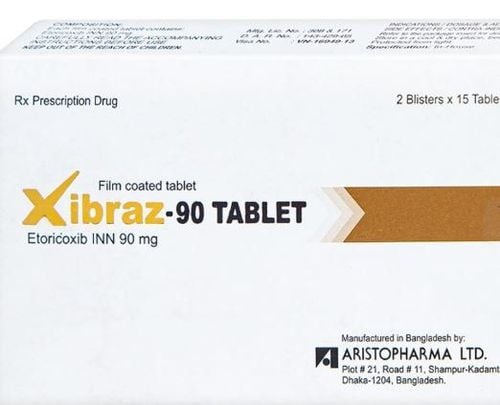This is an automatically translated article.
Fynkenac drug belongs to the group of non-steroidal anti-inflammatory drugs, treating bone and joint diseases, ... The drug is prepared in the form of an injectable solution, with the main ingredient being Diclofenac sodium 75mg/3ml. For more details about the use and how to use the drug, you can refer to the article below.
1. Indications - Uses of Fynkenac
Indications:
Chronic Rheumatoid Arthritis Rheumatoid Arthritis Ankylosing spondylitis Rheumatoid arthritis in psoriasis Acute Rheumatoid Arthritis Acute post-traumatic injury Periarthritis of the shoulder, forearm Tendonitis Bursitis Synovitis Bursitis Tendonitis Microcrystalline Arthritis Low back pain, severe nerve root pain Acute gout attack Renal colic Pain from gallstones Pain relief in minor surgery, tonsillectomy, trauma Dysmenorrhea Mechanism:
The active ingredient Diclofenac in Fynkenac has a rapid onset of action making it particularly suitable for the treatment of acute pain and inflammation. The inhibitory effect of prostaglandin biosynthesis of Fynkenac has been concluded in clinical trials, that prostaglandins play a very large role in causing inflammation, pain and fever. In vitro, diclofenac did not reduce proteoglycan biosynthesis in cartilage at concentrations comparable to those observed in humans. Fynkenac is a potent analgesic in moderate to severe pain, rapidly reducing spontaneous pain and movement pain, and reducing inflammatory and wound edema. Clinical studies have also shown that fynkenac with primary dysmenorrhea has the ability to relieve pain and reduce bleeding. In migraine headaches, Diclofenac has been shown to relieve headaches and improve associated nausea and vomiting.
2. Contraindications to the use of Fynkenac
Patients with hypersensitivity or irritation to the ingredients of fynkenac, aspirin or other non-steroidal anti-inflammatory drugs Patients with advanced peptic ulcers Asthma or bronchospasm Bleeding Cardiovascular disease Severe liver or kidney failure Pregnant and lactating women
3. Fynkenac drug interactions with other drugs
Lithium Digoxin Diuretic Glucocorticoid Anticoagulant Methotrexate
4. Side effects when taking Fynkenac
Epigastric pain Nausea, vomiting, diarrhea Gastrointestinal bleeding Stomach and duodenal ulcers Headache, dizziness, dizziness Erythema, rash Urticaria Liver and kidney dysfunction Blood-forming organ disorders
5. Dosage - How to use
How to use the drug: Inject deep and slow intramuscularly. Recommended dosage: Intramuscular injection: 01 ampoule of 75mg x 01 time/day. Severe cases: Intramuscular injection: 01 tube of 75mg x 02 times/day. In case of need, additional oral dosage form 50mg/day. After that, it is recommended to switch to oral treatment. Fynkenac is used as directed by your doctor. Refer to the dosage of Fynkenac indicated on the package, the drug leaflet or the instructions of your doctor or pharmacist. Do not self-medicate or change the dose.
6. Overdose, missed dose of Fynkenac and other treatment
Overdose: When taking an overdose of Fynkenac, the patient should stop taking it and notify the doctor or pharmacist immediately when there are serious abnormalities.
Missed dose: Fynkenac is prescribed by a doctor and is administered intramuscularly by medical staff. In case if you miss a dose, you should consult a doctor, assess the severity of the disease, see if it is indicated for injection, intramuscular or oral medication as appropriate. Patients need to strictly follow the instructions or consult a doctor before making a decision.
Fynkenac drug is an anti-inflammatory drug, relieves pain in musculoskeletal diseases, menstrual pain, gout, ... The drug needs to be used under the direction of a doctor to ensure safe use of the drug. If you still have any questions about Fynkenac, please contact your doctor immediately for answers.













